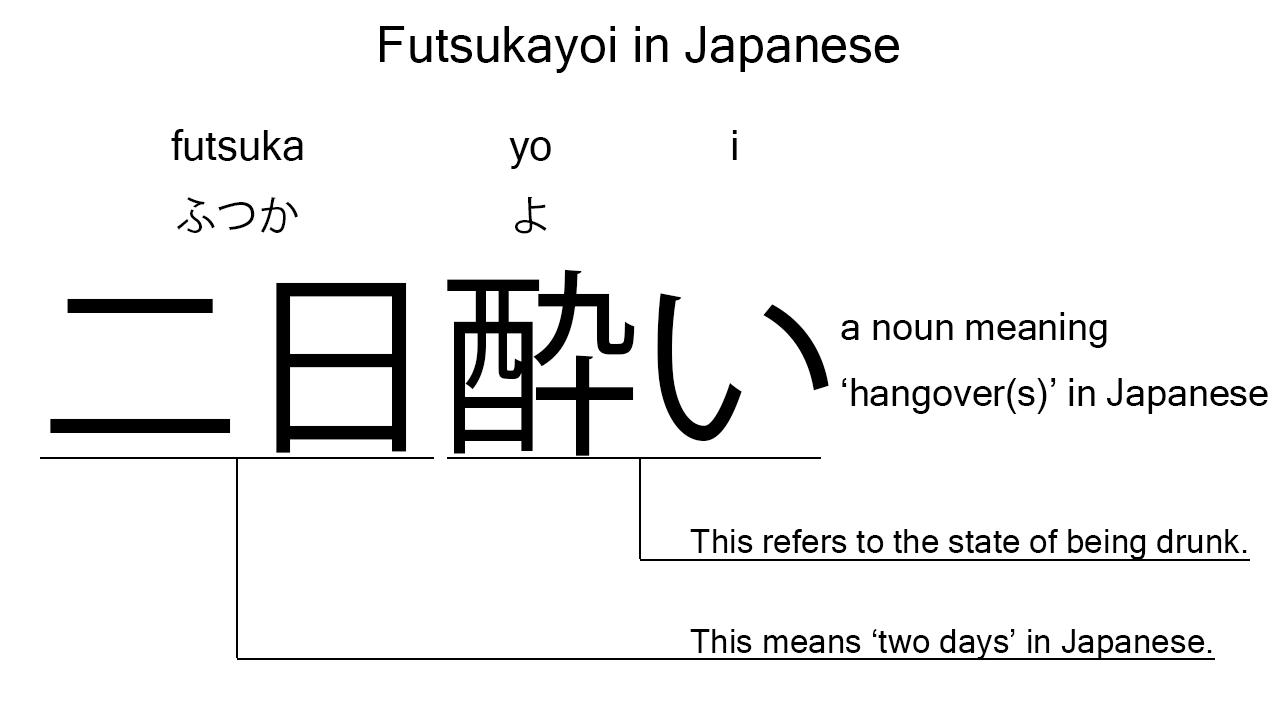What does “futsukayoi” mean in Japanese?
Native speakers say “futsukayoi” to mean ‘hangover’ in Japanese. Perhaps, some Japanese learners know this word as it is sometimes used in Japanese conversations. In this blog post, however, I will explain this word in detail based on its grammatical components. And also, I will explain how to use it through example sentences. My explanations would help Japanese learners understand “futsukayoi” more clearly. Then, let’s get started!
Contents
Definition and meaning of “futsukayoi”
Let me start with the definition and meaning of “futsukayoi”.
- futsukayoi – 二日酔い (ふつかよい) : a noun meaning ‘hangover’ in Japanese. This can also work as plural.
The definition and meaning are simple and clear, I think. To understand this noun more clearly, however, let me explain its grammatical components in detail, one by one.
What does “futsukayoi” literally mean in Japanese?
“Futsukayoi” consists of the following two components:
- futsuka – 二日 (ふつか) : a noun meaning ‘two days’ in Japanese.
- yoi – 酔い (よい) : a noun used to refer to the state of being drunk in Japanese.
From these two components, we can understand that “futsukayoi” literally means ‘being drunk for two days’ in Japanese. This literal interpretation is not completely in line with the actual meaning, but still understandable, I think. When we have a hangover, we can still be in the state of being drunk and feel sick because of the alcohol we’ve drunk the day before. So, we can feel like we are drunk for two days.

When we meet new Japanese words, we should check their grammatical components in detail to understand their meanings clearly and deeply. In many cases, components tell us a lot about the meaning of the words they form. Actually, here, we could get the better understanding of “futsukayoi” through the detailed check above.
So far, I’ve explained the definition and meaning of “futsukayoi” together with its grammatical components. Then, let me explain how to use it through the example sentences below.
Example #1: how to say “hangover” in Japanese
futsukayoi de atama ga itai – 二日酔いで頭が痛い (ふつかよいであたまがいたい)
My head is aching because of a hangover.
Below are the new words used in the example sentence.
- de – で : a case particle used to say why something happens. In the example, this is used after “futsukayoi” to say why the speaker’s head is aching.
- atama – 頭 (あたま) : a noun meaning ‘head’ in Japanese. This can also work as plural. Learn more about Japanese plural.
- ga – が : a case particle used to make the subject word or the object word in a sentence. In the example, this is used after “atama” to make the subject in the sentence.
- itai – 痛い (いたい) : an i-adjective often translated as ‘to be aching’ in Japanese.
This is a typical usage of “futsukayoi”. In this example, it works together with the case particle, “de”, to say “because of a hangover” in Japanese. Native speakers sometimes use this combination in conversations, so it’s worth knowing.
Example #2: another usage of “futsukayoi”
watashi wa kyou futsukayoi desu – 私は今日二日酔いです (わたしはきょうふつかよいです)
I have a hangover today.
Below are the new words used in the example sentence.
- watashi – 私 (わたし) : a pronoun meaning ‘I’ in Japanese.
- wa – は : a binding particle working as a case marker or topic marker. In the example, this works after “watashi” to make the subject in the sentence.
- kyou – 今日 (きょう) : a noun meaning ‘today’ in Japanese. This can also work as an adverb almost anywhere in a sentence. In the example, this works as an adverb in the middle of the sentence to say “today” in Japanese.
- desu – です : an auxiliary verb used after a noun or adjective to make it polite. Probably, this is well known as a part of Japanese desu form. In the example, this is used after “futsukayoi” to make it sound polite.
This is another typical usage of “futsukayoi”. In this example, it works as the complement in the sentence. The original meaning of the Japanese sentence is more like “I’m a hangover today”, but it has been translated in a natural way. Anyway, when we want to mean a ‘hangover’ in Japanese, this noun is always a very good option.
Summary
In this blog post, I’ve explained the definition and meaning of “futsukayoi” in detail based on its grammatical components. And also, I’ve explained how to use it through the example sentences. Let me summarize them as follows.
- futsukayoi – 二日酔い (ふつかよい) : a noun meaning ‘hangover’ in Japanese. This can also work as plural. This noun consists of “futsuka” and “yoi” which mean ‘two days’ and ‘the state of being drunk’ respectively. So, this noun literally means ‘being drunk for two days’ in Japanese. This literal interpretation is not completely in line with the actual meaning, but still understandable, I think. When we have a hangover, we can still be in the state of being drunk and feel sick because of the alcohol we’ve drunk the day before. So, we can feel like we are drunk for two days.
Hope my explanations are understandable and helpful for Japanese learners.
Leave a Reply